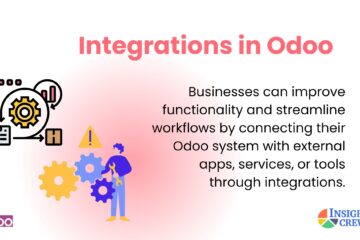ERP systems are crucial to a company’s ability to compete in a digital and globalised world. They offer the framework required to enhance different business procedures, efficiently oversee them, and consistently maximise business operations. Many companies use ERP solutions to satisfy consumer needs and quickly adjust to changes in the market.
ERP systems’ function in contemporary businesses
ERP systems are essential tools that assist businesses in centralising data, standardising internal procedures, and guaranteeing efficient operations and workflows. Standardised procedures also improve internal communication between a company’s various departments, including sales, production, human resources, and accounting. Information frequently stays segregated in the absence of an integrated solution, which causes delays and generally ineffective workflows.
ERP systems also give firms a great deal of transparency. When all data is consolidated into a single system, decision-makers may obtain a comprehensive picture, make superior, data-driven decisions, and have all pertinent information at their fingertips with a single click.
A systematic overview of all data is crucial, particularly when quick and accurate judgements must be made. It can also reveal a company’s success.
Using ERP to increase productivity and efficiency
Efficiency increases significantly when corporate activities are automated using an ERP system. Automated workflows can greatly increase the efficiency of various processes that were traditionally completed by hand in many firms, such as order processing or data entry. Significant time is saved, and all procedures are guaranteed to be accurate and consistent. Business process optimisation and overall work quality enhancement are two benefits of an ERP system.
Employees may access all pertinent information instantly thanks to centralised data management via an ERP system, which eliminates the need for time-consuming searches across several software programs. In the end, faster and more effective data processing results in a notable boost in overall business productivity.
Digitalisation is fuelled by automation and integration
ERP systems facilitate the smooth integration of several functions by connecting departments. This promotes cooperation and avoids information silos. Without effective cooperation between various business groups, a company’s potential for improvement stays unrealised.
In particular, automation is essential for minimising repetitive, time-consuming operations and preventing human error. ERP solutions optimise tasks like order processing, invoicing, and inventory control without the need for human interaction by allowing businesses to effectively design their processes through automated workflows. Faster procedures, reduced expenses, and improved execution reliability are advantageous to businesses.
Improved resource utilisation with ERP systems
Making effective use of all available resources, including people, equipment, and supplies, is essential to good business administration. By offering a range of planning and tracking capabilities to improve business process management, an ERP system helps maximise these resources.
ERP systems also help ensure that inventory is accurately tracked. By avoiding overstocking, businesses may guarantee that there is an adequate supply of material for manufacturing and save storage expenses. By doing this, delivery delays are avoided and the production process and supply chain as a whole are optimised.
Future-ready: How ERP systems increase businesses’ adaptability
Businesses now need to be more adaptable and agile than ever before due to the rapid evolution of technology and the ever-changing market. ERP systems operate as catalysts for innovation and advancement in addition to being instruments for streamlining current procedures. ERP systems also have a major impact on a business’s long-term competitiveness.
Businesses can react faster to changes in the market or their particular industries if they have adopted and utilised an ERP system for their work processes. A strong ERP infrastructure allows for faster workflow adjustments. Companies can gain a substantial competitive edge, especially in fiercely competitive industries, by exploring new business areas with little more work.
Using ERP technology to reduce costs
An ERP system can be used to minimise operating costs sustainably. Businesses can employ resources more effectively and minimise expensive errors caused by manual handling by automating and continuously improving business processes like inventory management and workforce planning.
Businesses can reduce personnel and administrative expenses as well as simplify the organisational structure of intricate operations and increase their agility by automating a variety of procedures. Multiple separate software solutions are no longer necessary with a flexible and interconnected system. This eliminates inefficient workflows, licensing fees, and the complicated data interchange between many technologies. Using an ERP system to manage all corporate processes enables thorough control over all operations and accurate planning. This boosts the overall effectiveness of the business.
The Reason Odoo Is a Cutting-Edge ERP System for the Digital Age
ERP systems are at the forefront of conversations on the digitalisation of enterprises in an era where organisations aim for flexibility, efficiency, and minimising overall costs.
Businesses of all sizes and sectors may seamlessly transition to digitalisation with Odoo ERP software. Odoo is a modular ERP system that stands out for its scalability and flexibility. Businesses can select from a variety of apps covering accounting, sales, procurement, warehouse management, project management, and CRM, and they can customise the ERP solution to meet their specific requirements. Businesses can choose the apps they require and modify Odoo at any time to suit their needs thanks to its modular design.
Since Odoo unifies all corporate operations into a single platform, departments and business domains can collaborate effectively and swiftly without depending on disparate, frequently incompatible software programs. This integration greatly enhances workflow and decision-making by offering real-time insights into several areas.
Odoo’s ease of use and intuitive user interface are further benefits. Additionally, Odoo may be used on local servers as well as in the cloud. Odoo’s open-source architecture gives businesses the freedom and chance to customise the program to fit their own requirements and operational procedures. Additionally, Odoo is dynamic and always changing, adjusting to new developments, laws, and user requirements.
Businesses have cutting-edge, adaptable ERP technology with Odoo—the perfect partner for automation and digital transformation.
Important attributes and advantages of Odoo:
- Structure in Modules
- Flexibility and Scalability
- Using Open Source to Reduce Costs
- Actual Data and Analytics
Odoo is a cutting-edge ERP system with extensive functionality, affordability, and flexibility that was created for the current digital environment. Odoo’s open-source base, modular design, and ongoing development make it a good choice for companies looking for an ERP solution that is flexible, affordable and allows expansion while also supporting the goals of digital transformation.


